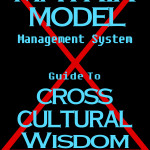Doing business today requires a global mindset as we increasingly interact with customers, vendors, employees, and colleagues from many countries and multiple cultures. Key strategies for developing that mindset are shared by colleagues at the Institute for Cross Cultural Management (ICCM) at the Florida Institute of Technology. Curtis Curry shows us how to build cultural competence and Dr. Richard Griffith looks at how you should tweak your Best Practices. Their articles in the American Diversity Report give us how-to advice on how to successfully participate in the global economy.
Continue reading Advice for Going Global – by Deborah Levine

